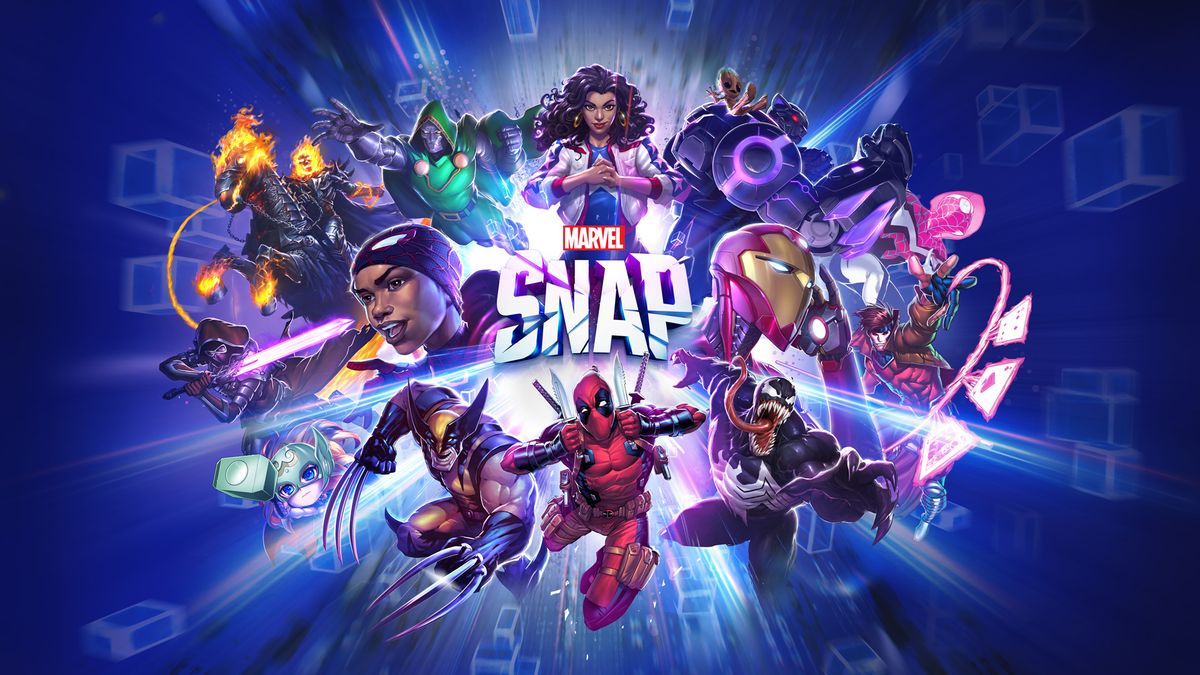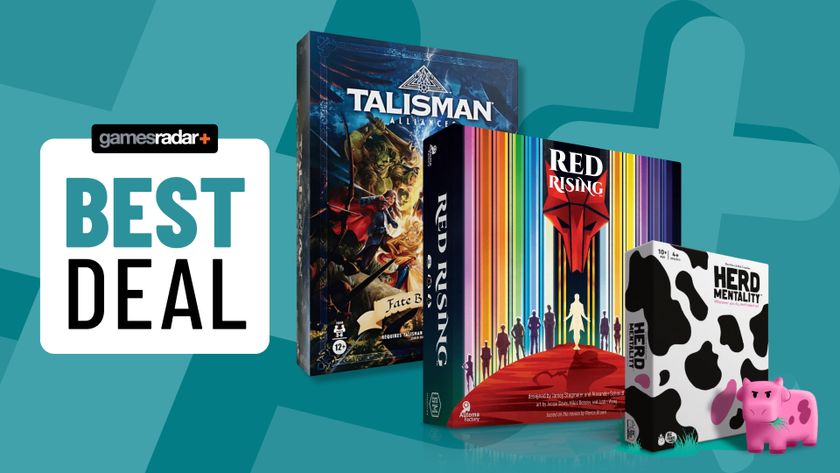12DOVE Verdict
Marvel Snap is a wonderfully intuitive card game that is simple to play, easy to learn, and satisfying to master. Games may take just six minutes to play, but there's a depth of strategy and breadth of variance here that is truly awesome.
Pros
- +
Quick to learn
- +
Intuitive design
- +
Easy deck building
Cons
- -
Messy progression systems
- -
Can't play with friends
Why you can trust 12DOVE
Marvel Snap makes me feel like a fucking genius. Not every so often, but every damn time. Developer Second Dinner may have positioned this game on the Apple and Android stores as a competitive card battler, but that was a mistake. It should have listed this thing under the Health & Fitness category – "A reliable ego boost, delivered efficiently across six-minute rotations or your money back." You can forget Hearthstone and Magic: The Gathering Arena, because Marvel Snap delivers the sort of quick dopamine hit that the genre titans could never. Quick games, simple rules, deep strategy; it's the CCG trifecta, designed for a generation of players too distracted to keep track of an overly complicated metagame.
Marvel Snap is exceptionally undemanding, of both your time and mental energy. You build a 12-card deck and put it to work in battles that unfold over three locations, across six turns where cards are played simultaneously. To win, you need only control two of three zones, but the journey to get there is often as electrifying as it is gratifying. Marvel Snap doesn't have you attacking the life totals (or negating the abilities) of individual cards played by an online opponent, but rather you work to lock in the highest power level at each available location to secure victory.
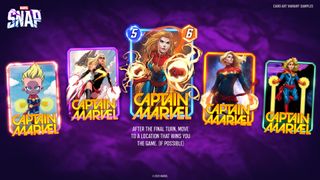
Release date: October 18, 2022
Platform(s): Android, iOS, PC
Developer: Second Dinner
Publisher: Nuverse
Every card in your hand has an energy cost dictating when it can be played (you earn one mana per turn) and an attack value, and many are equipped with special abilities which trigger once specific conditions are met. This card gains one attack power for every opposing card that is played in the same location, and that card gains four power if you play no others within the next turn. Each zone is equipped with unique effects too – buffs and debuffs, or game-altering shifts that reveal between turns. These may, say, double the ability effect of a card once it's revealed, or preclude any further cards being placed after a certain turn. As you begin to understand the relationship between these locations and the cards you are dealt from your deck, an extremely satisfying depth to the strategy reveals itself.
I'm acutely aware that describing the inner machinations of a CCG sounds acutely boring to anybody standing on the periphery of the genre. For those at least partially invested, just know that this is a free-to-play game without play-to-win mechanics, from a studio founded by former Hearthstone game director Ben Brode – if you're interested, give it a whirl. You'll know if it's your jam within two games, totaling just twelve minutes. For the rest of you, those who may have been scared off by the complexity that this style of game is famous for cultivating, or who otherwise thought they would never give a damn about a CCG, just give it a chance. Marvel Snap is approachable enough that even the most complex plays are so simple to execute that you won't believe that your opponent didn't think of them sooner.
Better bring a charger
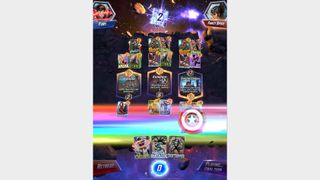
I want to be clear that while Marvel Snap is simple, it isn't shallow. This is a smartly designed experience that works because of the variance it offers, rather than in spite of it. You needn't memorize endless opening and counter plays; Marvel Snap asks only that you're present enough to consider the small number of cards in your hand on any given turn, and are able to understand how each possible play that you can make will work with and against the state of the board.
This clarity is key when you begin to consider the 'Snap' mechanic, which is introduced once you climb to Iron rank. It takes 10 Cosmic Cubes to level up, and a standard win will net you two cubes. However, at any point in a game you (or your opponent) is able to 'Snap' – doubling the return of Cubes, should you win. If both players 'Snap', you'll be playing for eight Cubes, which is effectively an entire rank, although a handy 'Retreat' option is always available should you feel like too much is on the line. While this system isn't the cleanest, it massively raises the stakes of any given game, and the capacity to successfully bluff opponents into when you can see the tide turning against you is always a delight.
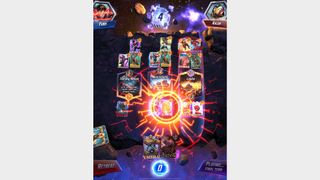
"Marvel Snap is designed for a generation of players too distracted to keep track of an overly complicated metagame"
Admittedly, it is Marvel Snap's core progression systems that feel the least refined. There's a battle pass, daily missions to complete, and systems in place to upgrade the visual design of your unlocked cards – all three can be sped up with microtransactions, though you aren't able to pay for specific cards or increase the power levels of your favorites. It's all a little much, and a particularly busy UX doesn't help either. If anything the card collecting and progression aspects to Marvel Snap feel like distractions right now from an otherwise excellent experience.
While there's hope that Second Dinner improves these aspects over time, I'd rather the studio invested in other areas. For example, you aren't able to challenge buddies to battle, test new deck-builds against AI, or view and share your stats in-game – that's a shame, because I get the sense that Marvel Snap is designed to encourage a little braggadocio behavior on social media. Because, right now, Marvel Snap is the sort of 'pick-up-and-play' mobile game that'll have you reaching for your phone charger – and I'm desperate to share it with friends.
Marvel Snap was reviewed on Google Pixel 7 Pro, and I am yet to purchase any in-game currency.
More info
| Genre | Strategy |

Josh West is the Editor-in-Chief of 12DOVE. He has over 15 years experience in online and print journalism, and holds a BA (Hons) in Journalism and Feature Writing. Prior to starting his current position, Josh has served as GR+'s Features Editor and Deputy Editor of games™ magazine, and has freelanced for numerous publications including 3D Artist, Edge magazine, iCreate, Metal Hammer, Play, Retro Gamer, and SFX. Additionally, he has appeared on the BBC and ITV to provide expert comment, written for Scholastic books, edited a book for Hachette, and worked as the Assistant Producer of the Future Games Show. In his spare time, Josh likes to play bass guitar and video games. Years ago, he was in a few movies and TV shows that you've definitely seen but will never be able to spot him in.
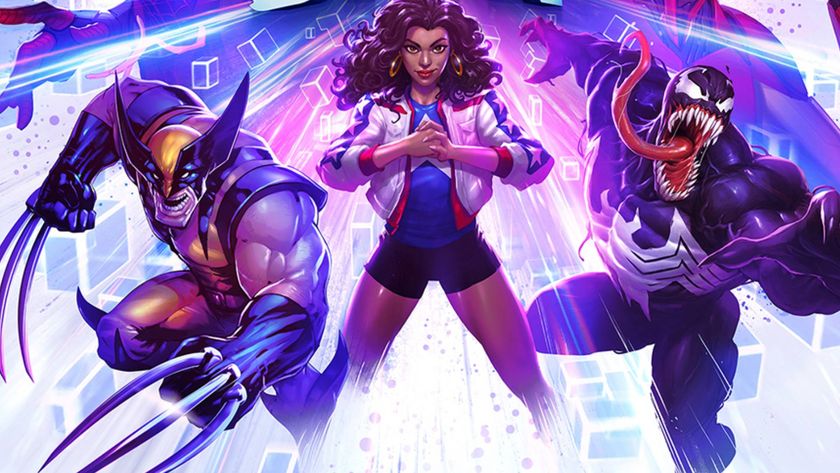
In a perfect Avengers homage, Marvel Snap has blipped back into existence in the US, and it's looking for a new publisher "to make sure this NEVER happens again"
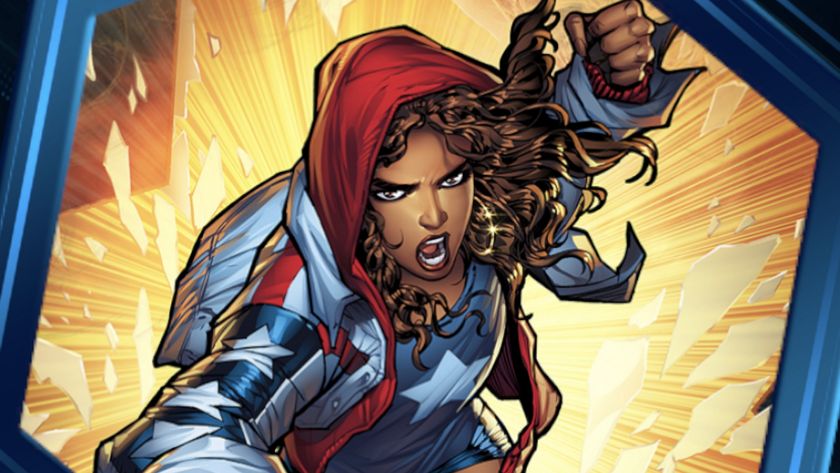
Marvel Snap is also down due to today in a "surprise" bit of collateral damage amid the TikTok ban, probably because they're both owned by the same company
